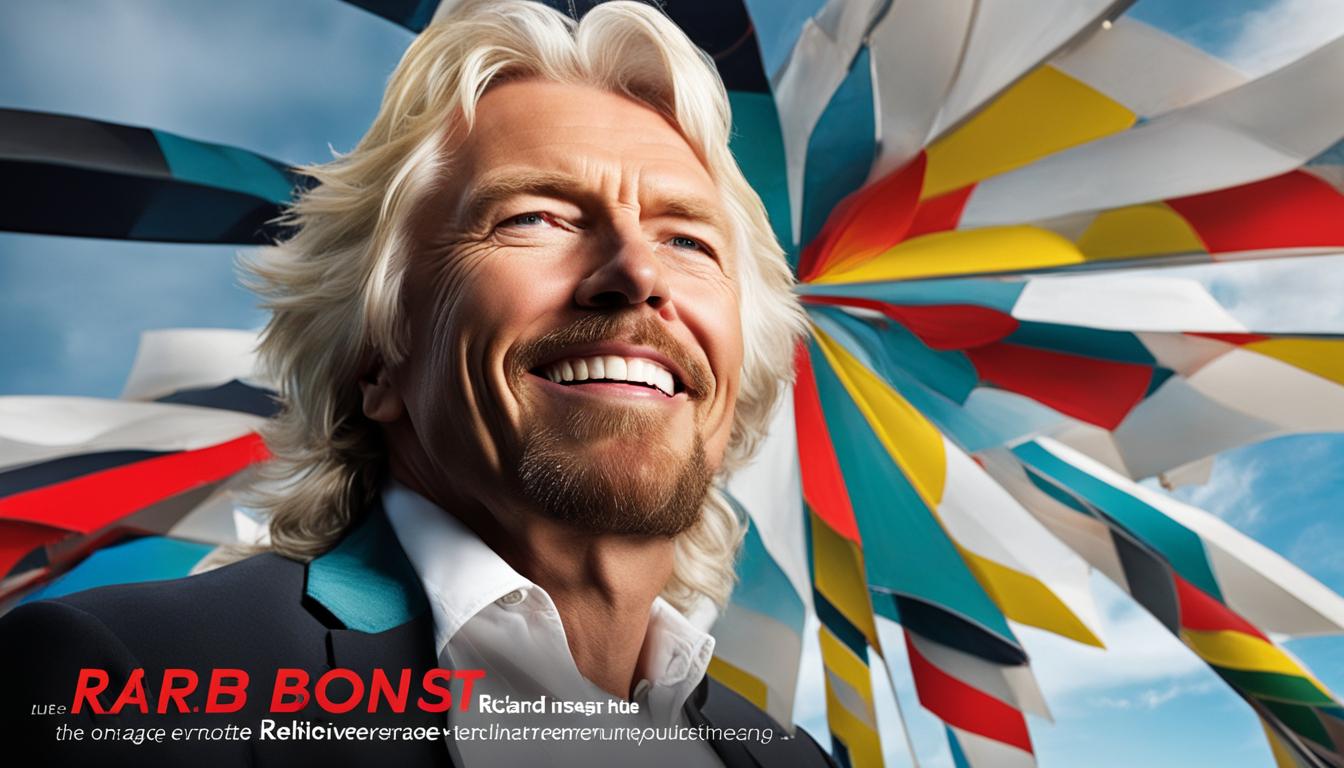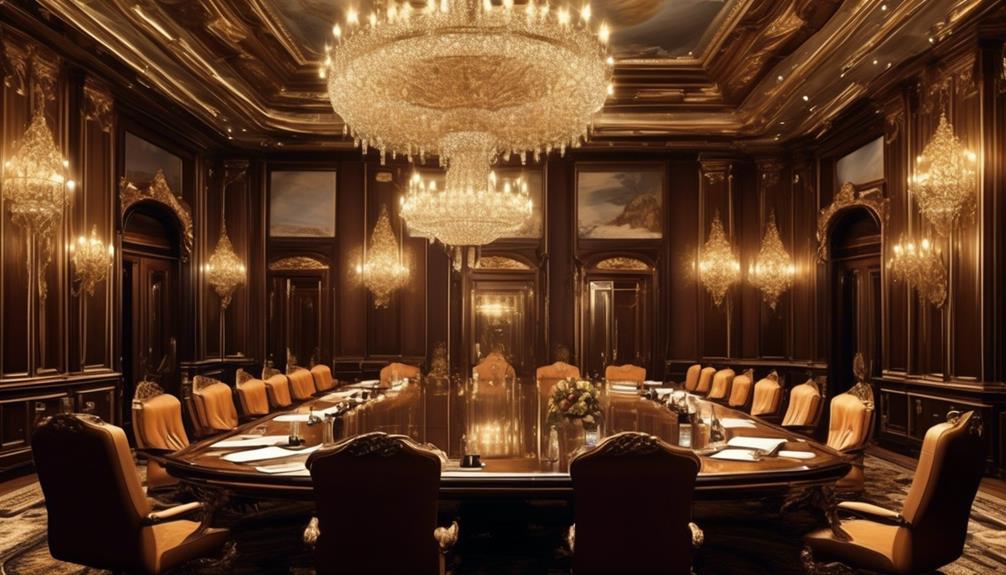We are excited to share our article about Richard Branson, the driving force behind the well-known Virgin Group. Branson’s impressive journey to success is remarkable for his accomplishments, innovative creativity, and unwavering entrepreneurial spirit, despite leaving school early.
In this article, we will delve into some of Richard Branson’s most famous and inspiring quotes that have motivated countless entrepreneurs around the world. From his thoughts on overcoming failure to his approach to business and taking risks, Branson’s wisdom offers valuable insights for aspiring and established entrepreneurs alike.
So let’s dive in and explore the insightful and motivating quotes from Richard Branson that can ignite your entrepreneurial spirit and help you achieve your goals.
Key Takeaways:
- Richard Branson’s quotes serve as inspiration for entrepreneurs and leaders.
- Branson’s journey started with a youth culture magazine and led to the establishment of Virgin Records.
- He encourages individuals to embrace failure as a learning opportunity and not to fear starting over.
- Branson believes in creating businesses that have a purpose beyond profit and staying true to oneself.
- He emphasizes the importance of taking bold risks and making decisions without fear of failure.
Richard Branson’s Journey to Success
Richard Branson’s success story is a testament to his exceptional leadership skills, entrepreneurial spirit, and unwavering determination. His journey began with the creation of a youth culture magazine in the 1960s, which laid the foundation for his future ventures. Branson’s passion for music led him to establish Virgin Records, a record label that quickly gained prominence in the industry.
Throughout his career, Branson has demonstrated remarkable leadership qualities, inspiring others with his innovative thinking and willingness to take risks. His ability to envision opportunities and develop new business ventures has made him one of the most influential entrepreneurs of our time.
“Screw it, let’s do it!”
Branson’s famous quote reflects his fearless approach to entrepreneurship. He encourages individuals to embrace challenges and seize opportunities without hesitation. This mindset has been a driving force behind his success.
Branson’s passion for entrepreneurship extends beyond his own ventures. He is a strong supporter of aspiring entrepreneurs, offering guidance and inspiration through his leadership quotes and wisdom.
“A business is simply an idea to make other people’s lives better.”
Branson believes that successful businesses are built on the foundation of providing value and improving the lives of others. This philosophy has shaped his approach to business and inspired countless entrepreneurs to prioritize creating meaningful solutions.
| Key Success Factors | Richard Branson’s Approach |
|---|---|
| Leadership | Branson leads by example, motivating and empowering his teams to achieve greatness. |
| Risk-Taking | Branson embraces risk and encourages others to do the same, seeing failure as a stepping stone to success. |
| Vision | Branson thinks big and sets ambitious goals, constantly pushing the boundaries of innovation. |
| Resilience | Branson’s ability to bounce back from failures and setbacks has been critical to his success in the face of adversity. |
| Adaptability | Branson embraces change and adapts quickly to market trends, staying ahead of the curve. |
| Relationship-Building | Branson values collaboration and fosters strong relationships with partners, employees, and customers. |
Richard Branson’s journey is a source of inspiration for aspiring entrepreneurs and leaders. His success quotes, leadership principles, and entrepreneurial mindset continue to resonate in the business world, offering valuable lessons for those seeking to make their mark.
Richard Branson on Overcoming Failure
Richard Branson, the renowned entrepreneur and founder of the Virgin Group, has always emphasized the importance of embracing failure as a stepping stone to success. He believes that setbacks are not roadblocks but rather opportunities for growth and learning. Branson encourages individuals to view failure as a natural part of the journey and to not let it discourage them from pursuing their goals.
One of Branson’s motivational quotes about life highlights this perspective: “Do not be embarrassed by your failures, learn from them and start again.” This quote serves as a powerful reminder that failure should not be a source of shame or humiliation, but rather a valuable experience that can pave the way for future achievements.
“You don’t learn to walk by following rules. You learn by doing and falling over.”
In this quote, Branson encourages individuals to take risks and not be afraid of stumbling along the way. He believes that true learning happens through action and experience, even if it means making mistakes.
Branson’s words of wisdom serve as a source of inspiration for those facing obstacles in both life and business. They remind us that failure is not the end but an opportunity to reassess, learn, and come back stronger.

Overcoming Obstacles in Business
Richard Branson’s experiences in business have taught him valuable lessons about overcoming challenges. He has faced numerous setbacks and failures throughout his entrepreneurial journey, but he never let them deter him from moving forward. Instead, Branson uses these experiences to develop resilience and fuel his determination to succeed.
When it comes to business, Branson believes in taking risks and pushing boundaries. He once said, “Opportunities are like buses, there’s always another one coming.” This quote reflects his belief that setbacks should not be seen as missed opportunities, but rather as stepping stones to the next big thing.
“Screw it, let’s do it!”
This famous quote by Branson encapsulates his fearless attitude towards taking risks. It encourages individuals to seize opportunities, even if they seem daunting or uncertain.
Branson’s philosophy on overcoming failure has undoubtedly played a significant role in his success as an entrepreneur. By embracing failure as a learning opportunity, he has been able to turn setbacks into stepping stones and achieve remarkable feats in his career.
Richard Branson’s Approach to Business
When it comes to business, Richard Branson has a unique approach that sets him apart from others in the corporate world. He believes in creating businesses that have a purpose beyond profit. Branson emphasizes the importance of staying true to oneself and focusing on the essentials in business.
Branson’s words of wisdom remind us that success goes beyond financial gain. It’s about making a positive impact on the world and bringing value to people’s lives. Here are some of his insightful quotes that highlight his approach to business:
“Business opportunities are like buses, there’s always another one coming.”
This quote reflects Branson’s mindset of abundance and endless possibilities. He encourages entrepreneurs to be patient and resilient, knowing that there will always be new opportunities on the horizon.
“A business is simply an idea to make other people’s lives better.”
For Branson, the focus of business should be on improving the lives of others. By providing valuable products or services, businesses can make a positive impact and create lasting change.
“Respect is how to treat everyone, not just those you want to impress.”
Branson believes in treating everyone with respect, regardless of their status or position. By fostering a culture of respect, businesses can build strong relationships and create a positive work environment.

Richard Branson’s approach to business is centered around purpose, authenticity, and making a difference. His words of wisdom serve as a guide for entrepreneurs and business leaders, reminding us to focus on what truly matters and to create businesses that leave a lasting impact.
Richard Branson on Taking Risks
Richard Branson, the renowned entrepreneur and founder of the Virgin Group, is widely known for his willingness to take bold risks in business. His success is built on a foundation of fearlessness and the ability to make decisions without the fear of failure. Branson believes that taking risks is an essential part of achieving success, as it opens doors to new opportunities and allows for personal and professional growth.
One of Branson’s famous success quotes is: “Screw it, just do it.” This quote reflects his attitude towards risk-taking and the importance of seizing opportunities without hesitation or self-doubt. It embodies his belief that taking calculated risks is necessary for pushing boundaries, exploring uncharted territories, and ultimately achieving greatness.
Branson encourages individuals to embrace risk-taking in their own lives and careers. He believes that being open to taking risks allows people to challenge themselves, step out of their comfort zones, and unlock their full potential. By taking risks, individuals can overcome their fears, learn from failures, and achieve extraordinary results.
“You don’t learn to walk by following rules. You learn by doing and by falling over.”
Branson’s motivational quotes inspire individuals to see risks as opportunities rather than obstacles. His boldness and confidence serve as a reminder that great achievements often require stepping into the unknown and venturing into uncharted territory.
Daring to Dream
Branson’s success is a testament to the power of dreaming big and pursuing audacious goals. He encourages aspiring entrepreneurs to have a vision that goes beyond the ordinary, to push boundaries, and to believe in their own abilities. Branson’s philosophy is rooted in the idea that taking risks is necessary to turn dreams into reality.
By embracing risk-taking, individuals can overcome self-imposed limitations and set themselves on a path to success. Branson’s own journey is proof that fearlessness and a willingness to take risks can lead to remarkable achievements and extraordinary experiences.
| Benefits of Taking Risks | How to Manage Risks |
|---|---|
|
|
The Bottom Line
Richard Branson’s approach to taking risks inspires individuals to have the courage to step outside their comfort zones and pursue opportunities with conviction. His success quotes and motivational insights remind us that risk-taking is an essential ingredient for achieving greatness in both life and business. By embracing risks and fearlessly pursuing our dreams, we can unleash our true potential and create a life filled with success, satisfaction, and fulfillment.

Richard Branson on Building a Strong Team
Richard Branson, the renowned entrepreneur and founder of the Virgin Group, understands the crucial role of a strong team in achieving success. He firmly believes in surrounding oneself with the right people, individuals who possess the necessary skills, passion, and dedication.
Branson’s leadership quotes reflect his philosophy on teamwork and entrepreneurship. One of his notable quotes states, ““Succeeding in business is all about making connections and building relationships.” This highlights the importance of fostering strong connections within a team and building mutually beneficial relationships.
“Finding the right people and giving them the freedom to take risks and learn from their mistakes is an essential part of building a strong team.”
According to Branson, team members should be given the opportunity to reinvent themselves and unleash their full potential. By trusting and empowering individuals, they can contribute their unique perspectives and talents to drive the success of a business.
A successful team is not just about individual contributions but also about collaboration and unity. Branson advises, ““Listening to others and working together leads to better ideas and more successful outcomes.” By embracing diversity and actively listening to team members, a leader can harness the collective intelligence and creativity of the team.
An effective team is built on shared values and a common vision. Branson’s entrepreneurship quotes often highlight the importance of a shared purpose and a sense of camaraderie. As he puts it, ““If you can create a sense of belonging and purpose, people will want to work with you to achieve something extraordinary.”
Branson’s emphasis on building a strong team is evident in the way he has cultivated successful ventures spanning various industries, from music to aviation and beyond. His leadership quotes serve as a reminder that teamwork plays a vital role in achieving entrepreneurial success and making a lasting impact.
| Benefits of a Strong Team | Examples |
|---|---|
| Enhanced creativity and innovation | Virgin Galactic’s groundbreaking initiatives in space exploration |
| Increased productivity and efficiency | Virgin Atlantic’s consistent growth and customer satisfaction |
| Improved problem-solving capabilities | Virgin Mobile’s innovative solutions in the telecommunications industry |
| Effective decision-making and strategic planning | Virgin Hotels’ successful expansion into the hospitality industry |
- Richard Branson’s leadership quotes inspire individuals to focus on building a cohesive and high-performing team.
- By surrounding oneself with the right people and empowering them, business leaders can unlock the full potential of their team.
- Listening, collaboration, and shared values are essential elements in creating a strong team.
- Strong teams lead to enhanced creativity, increased productivity, improved problem-solving, and effective decision-making.
Richard Branson on Having Fun in Business
Richard Branson firmly believes that having fun is an essential ingredient for achieving success in business. He recognizes that when we enjoy what we do, it fuels our motivation, creativity, and overall productivity. Branson encourages individuals to find joy in their work and not let stress and unhappiness consume them. He emphasizes the importance of creating a positive and enjoyable workplace environment where employees feel inspired and motivated.
“You spend a lot of time at work, so make sure you have fun. Create a workplace where people feel comfortable expressing their ideas, laughing, and enjoying each other’s company. A happy and engaged team will go the extra mile to achieve extraordinary results.”
Branson’s philosophy is centered around the idea that work and play are not mutually exclusive. He believes that by incorporating fun and enjoyment into our daily work lives, we can enhance creativity, foster stronger relationships, and ultimately achieve greater success. Branson has applied this principle throughout his career, building a business empire that spans various industries, while never forgetting to have fun along the way.
Embracing a Fun Work Culture
Branson encourages business leaders and entrepreneurs to foster a culture that embraces fun and innovation. He believes that a positive work culture promotes collaboration, risk-taking, and a sense of belonging among team members. By creating an atmosphere where enjoyment and excitement are valued, businesses can achieve higher levels of employee engagement and satisfaction, leading to increased productivity and success.
Benefits of Having Fun in Business
Branson’s emphasis on having fun in business is not only about creating a pleasant work environment; it also brings numerous benefits to individuals and organizations:
- Inspiration and Creativity: When we enjoy what we do, we are more likely to approach tasks with enthusiasm and motivation. This, in turn, sparks our creativity, leading to innovative ideas and solutions.
- Productivity and Efficiency: Having fun in the workplace leads to higher levels of job satisfaction and engagement, which can result in increased productivity and efficiency.
- Employee Retention: A fun and enjoyable work culture fosters a sense of loyalty and commitment among employees, reducing turnover rates and retaining top talent.
- Positive Brand Image: Businesses that prioritize fun and happiness are often seen as desirable employers and attract like-minded individuals. This can enhance the company’s reputation and contribute to its overall success.
“If you’re not having fun, you’re doing it wrong. It’s as simple as that.” – Richard Branson
Branson’s quote serves as a reminder that we should strive to find joy in our professional pursuits. By infusing fun, excitement, and enjoyment into our work lives, we can create a foundation for long-term success and fulfillment in business.
Richard Branson on Thinking Big
Richard Branson, the renowned entrepreneur and founder of the Virgin Group, is known for his ability to think big and set ambitious goals. He firmly believes that having a big picture mindset is essential for achieving success in both life and business.
Branson understands the power of visualization and emphasizes the importance of dreaming big. He encourages individuals to envision their goals and aspirations clearly, allowing their imagination to push the boundaries of what is possible. By thinking big, Branson believes that one can unleash their full potential and tap into opportunities that may have seemed unimaginable.
“The sky is not the limit – your belief system is.”
In order to turn these grand visions into reality, Branson emphasizes the importance of taking action. He encourages individuals to break down their big goals into smaller, manageable steps, and to approach each task with determination and resilience.
Branson’s philosophy of thinking big extends beyond individual goals. He believes that businesses should be driven by a larger purpose and should seek to make a positive impact on the world. By setting audacious goals and focusing on creating a better future, Branson has built the Virgin Group into a global empire spanning multiple industries.
Embracing Branson’s mindset of thinking big can inspire individuals to overcome limitations, expand their horizons, and achieve extraordinary success. By envisioning a bigger and brighter future, one can unlock their true potential and make a lasting impact on the world.

The Power of Thinking Big
Thinking big has the potential to revolutionize our lives and businesses. It allows us to challenge conventional norms, break free from limitations, and achieve extraordinary results. When we cultivate a mindset that embraces audacious goals and limitless possibilities, we open ourselves up to a world of innovation and endless potential. Richard Branson’s success is a testament to the power of thinking big, and by embracing this philosophy, we too can unlock our true potential and create a future that surpasses our wildest dreams.
Richard Branson on Building Relationships
Richard Branson understands the value of trust and the power of nurturing relationships. He believes that building strong connections with others is fundamental in both business and leadership. Through his experiences, Branson emphasizes the importance of making quick judgments about people’s trustworthiness, allowing him to form valuable partnerships and create a positive working environment.
“Business is all about trust. Trust your instincts, trust your team, trust your judgment. Trust is the glue that holds all relationships together.”
Branson’s approach to building relationships involves creating an environment where individuals feel empowered to reinvent themselves and contribute to the success of the organization. He values authenticity and encourages trust-building activities that foster open communication and collaboration among team members.
By prioritizing relationship building, Branson has been able to establish a strong network of partners, employees, and customers who share his vision and values. This network has played a crucial role in the success of the Virgin Group and its various ventures.
Richard Branson’s Tips for Building Relationships
| Tips | Description |
|---|---|
| 1 | Be genuine and authentic in your interactions. People appreciate honesty and openness. |
| 2 | Listen actively to others. Show genuine interest in their thoughts, ideas, and concerns. |
| 3 | Empower individuals to take ownership and contribute to the organization’s goals. |
| 4 | Encourage collaboration and open communication to build strong bonds within the team. |
| 5 | Recognize and appreciate the contributions of others. Show gratitude for their efforts. |
Richard Branson’s belief in the power of building relationships serves as a guiding principle for entrepreneurs and leaders looking to create a positive and cohesive work environment. By investing in trust and nurturing connections, individuals can form lasting partnerships and achieve success in their personal and professional endeavors.

Richard Branson on the Importance of Lists
Richard Branson, the renowned entrepreneur and founder of the Virgin Group, understands the significance of effective organization in business and life. Branson is known for his meticulous attention to detail and a habit that sets him apart from others – making lists. His belief is that writing down everything allows for better focus, improved listening, and more effective execution of ideas.
“I’ve always lived by the philosophy that if you write down the things you need to do, the chances of getting them done increase dramatically.”
Branson’s reliance on lists is a testament to their effectiveness in maintaining clarity amidst the chaos of entrepreneurial ventures. By creating lists, we not only have a tangible representation of our goals but also a roadmap to drive our actions and monitor progress. These lists enable us to prioritize tasks, allocate resources efficiently, and maintain a sense of control over our endeavors.
Richard Branson’s Top Tips for List-Making:
- Be Specific: Clearly define each task or goal.
- Stay Organized: Group related items together for enhanced productivity.
- Set Deadlines: Assign timelines to ensure timely completion.
- Prioritize: Identify and tackle high-priority items first.
- Review and Revise: Regularly update and refine your lists to reflect changing circumstances.
Whether it’s a simple to-do list or a comprehensive strategic plan, Richard Branson’s meticulous approach to list-making exemplifies the power of organization and focus. By incorporating this practice into our own entrepreneurial journeys, we can enhance our productivity, overcome challenges, and achieve our full potential.
| Benefit of List-Making | Explanation |
|---|---|
| Enhanced Productivity | Lists help us prioritize tasks, stay organized, and track progress effectively. |
| Improved Focus | By incorporating lists, we can maintain focus on goals and avoid distractions. |
| Tangible Roadmap | Lists provide a clear visual representation of our goals and guide our actions. |
| Efficient Resource Allocation | List-making helps us allocate resources strategically, optimizing our efforts. |
Richard Branson on Gratitude and Politeness
Richard Branson, the renowned entrepreneur and founder of the Virgin Group, firmly believes in the power of gratitude and politeness in both life and business. He recognizes the importance of expressing appreciation to others and acknowledging their contributions.
Branson’s leadership quotes highlight the significance of gratitude as a quality that fosters positive relationships and strengthens connections. His success quotes emphasize the role of politeness in business interactions, emphasizing the importance of treating others with respect, regardless of their position or status.
“Saying thank you is more than good manners, it is good spirituality.”
These words from Branson remind us that expressing gratitude goes beyond mere etiquette; it is an essential aspect of one’s character and an expression of gratitude for the opportunities and support received along the way.
The Power of Politeness in Business
Branson’s business quotes underscore the significance of politeness in the corporate world. He believes that treating people with kindness and respect creates a positive work environment, boosts morale, and fosters a culture of collaboration and teamwork.
In Branson’s view, politeness is not a sign of weakness but rather a demonstration of strength. It reflects a genuine and authentic leadership style that values the contributions of others and creates a sense of belonging within the organization.
Recognizing Contributions
Branson’s success as an entrepreneur is rooted in his ability to recognize and appreciate the efforts of those around him. He understands the importance of acknowledging the contributions of his team members and making them feel valued and appreciated.
By expressing gratitude for the hard work and dedication of his employees, Branson not only reinforces their commitment but also inspires loyalty and cultivates a sense of pride in their work.
The Ripple Effect
Branson’s philosophy of gratitude and politeness extends beyond individual interactions. He believes that these qualities have a ripple effect, positively impacting both personal and professional relationships.
Cultivating a culture of gratitude and politeness within an organization paves the way for enhanced collaboration, improved communication, and increased employee satisfaction. It creates a positive atmosphere where everyone feels valued and motivated to contribute their best.
Richard Branson’s leadership and success quotes on gratitude and politeness serve as a reminder of the profound impact such qualities can have on individuals and organizations. By embodying these principles, entrepreneurs and business leaders can create a more harmonious and fulfilling work environment, leading to greater success and satisfaction for all.
Richard Branson on Luck and Failure
Richard Branson, the renowned entrepreneur and founder of the Virgin Group, believes that luck is not a random occurrence, but rather a result of preparation meeting opportunity. He emphasizes the importance of being ready to seize opportunities when they come your way, as success often requires a combination of hard work, dedication, and the ability to recognize and act on favorable circumstances.
Branson’s success story is a testament to his belief in the power of preparation and seizing opportunities. From starting a youth culture magazine to launching Virgin Records and later expanding his ventures into various industries, he has consistently shown a knack for identifying and capitalizing on emerging trends and market gaps.
While luck can play a role in entrepreneurial success, Branson also recognizes the importance of learning from failures. He encourages individuals to see failure as a stepping stone toward success and to not be discouraged by setbacks. In his words, “You don’t learn to walk by following rules. You learn by doing and falling over.”
“You don’t learn to walk by following rules. You learn by doing and falling over.”
Branson’s motivational quotes echo a resilient mindset that embraces failure and treats it as a valuable learning experience. He recognizes that failure is a natural part of the entrepreneurial journey and that it is through setbacks that we grow, learn, and ultimately achieve success.
Branson’s words remind us that luck is not simply a matter of chance, but rather the product of being prepared and open to possibilities. By learning from failures and persisting in our endeavors, we increase our chances of encountering and capitalizing on opportunities that can lead to success.
Motivational Richard Branson Quotes:
- “Business opportunities are like buses; there’s always another one coming.”
- “Screw it, let’s do it!”
- “The brave may not live forever, but the cautious do not live at all.”
- “The best way of learning about anything is by doing.”
Conclusion
Richard Branson’s quotations embody his entrepreneurial spirit and offer valuable insights for individuals seeking inspiration and success in their own lives and businesses. From his famous quotes, we can learn about his approach to overcoming failure, taking risks, thinking big, and building strong teams.
Branson’s emphasis on embracing failure as a learning opportunity resonates with those striving for personal and professional growth. His motivational quotes encourage individuals to step out of their comfort zones and pursue their dreams fearlessly, knowing that failure is part of the journey.
Additionally, Branson’s advocacy for building strong teams and nurturing relationships underscores the importance of collaboration and trust in achieving business success. His leadership quotes inspire individuals to surround themselves with like-minded individuals who share their passion and drive.
In conclusion, Richard Branson’s famous quotes encapsulate his wisdom and experience as an entrepreneur. His words serve as a guiding light for those seeking inspiration and motivation on their own entrepreneurial journey.
What Makes Max Markson’s Quotes Relevant for Entrepreneurs?
Entrepreneurs find inspiration from famous Australian Max Markson quotes. His insightful words resonate with their drive and ambition. Markson’s quotes about seizing opportunities, perseverance, and risk-taking offer valuable wisdom for those navigating the business world. His perspective on success and business is highly regarded among entrepreneurs.
FAQ
What are some inspiring Richard Branson quotations for entrepreneurs?
Richard Branson has shared many inspiring quotes, such as “Screw it, let’s do it” and “The best way of learning about anything is by doing.” These quotes encourage entrepreneurs to take action and embrace a hands-on approach to learning and growing their businesses.
How did Richard Branson achieve success?
Richard Branson’s journey to success began with a youth culture magazine and eventually led to the establishment of Virgin Records. Throughout his career, he has demonstrated strong leadership qualities, embraced entrepreneurship, and taken bold risks to build the Virgin Group into the conglomerate it is today.
What does Richard Branson say about overcoming failure?
Richard Branson believes that failure is a natural part of the entrepreneurial journey. He encourages individuals to embrace failure as a learning opportunity and not to be afraid of starting over. One of his famous quotes is “You don’t learn to walk by following rules. You learn by doing, and by falling over.”
What is Richard Branson’s approach to business?
Richard Branson believes in creating businesses that have a purpose beyond profit. He emphasizes the importance of staying true to oneself and focusing on the essentials in business. His quote, “Complexity is your enemy. Any fool can make something complicated. It is hard to keep things simple,” reflects his belief in simplicity and efficiency.
How does Richard Branson view risk-taking?
Richard Branson is known for taking bold risks and making decisions without fear of failure. He encourages individuals to embrace risk-taking and protect against potential downsides. One of his famous quotes is “The brave may not live forever, but the cautious do not live at all.”
What does Richard Branson emphasize about building a strong team?
Richard Branson believes in surrounding oneself with the right people. He values giving individuals the opportunity to reinvent themselves and contribute to the success of a business. His quote, “Train people well enough so they can leave, treat them well enough so they don’t want to,” highlights the importance of nurturing talent and creating a positive work environment.
How does Richard Branson view having fun in business?
Richard Branson believes that having fun and enjoying the journey is crucial to business success. He encourages individuals to find joy in their work and not let stress and unhappiness consume them. His quote, “Fun is one of the most important – and underrated – ingredients in any successful venture,” reflects his belief in the power of enjoyment.
What does Richard Branson say about thinking big?
Richard Branson encourages individuals to think big and set ambitious goals. He believes in the power of visualization and having a big picture mindset. His quote, “The sky is not the limit, your mind is,” inspires individuals to dream beyond constraints and push their boundaries.
How does Richard Branson view building relationships?
Richard Branson values building trust and nurturing relationships. He believes in making quick judgments about people’s trustworthiness and creating an environment where individuals can reinvent themselves. His quote, “Success in business is all about people, people, people. Whatever industry a company is in, its employees are its biggest competitive advantage,” emphasizes the importance of building strong connections.
What is Richard Branson’s approach to the importance of lists?
Richard Branson is known for his organizational skills and the habit of making lists. He believes that writing everything down helps in listening and acting upon ideas effectively. His quote, “Write it. Shoot it. Publish it. Crochet it, sauté it, whatever. MAKE.” highlights the power of capturing ideas and taking action.
What does Richard Branson say about gratitude and politeness?
Richard Branson emphasizes the importance of gratitude and politeness in life and business. He believes in saying thank you to others and recognizing their contributions. His quote, “Always treat people with respect, even those who can’t do anything for you, because you never know when you might need them,” serves as a reminder of the value of kindness.
How does Richard Branson view luck and failure?
Richard Branson believes that luck is a result of preparation meeting opportunity. He encourages individuals to learn from failures and persist in their entrepreneurial endeavors. His quote, “You don’t learn to walk by following rules. You learn by doing, and by falling over,” reflects his belief in the iterative nature of success.
What are some of Richard Branson’s most famous quotations?
Richard Branson’s famous quotes include “Screw it, let’s do it,” “The brave may not live forever, but the cautious do not live at all,” and “Write it. Shoot it. Publish it. Crochet it, sauté it, whatever. MAKE.” These quotes capture his entrepreneurial spirit and offer valuable insights for individuals seeking inspiration and success in their own lives and businesses.
Lauren’s talent in writing is matched by her passion for storytelling. Her love for books and deep understanding of culture and entertainment add a distinct flavor to her work. As our media and press contact, Lauren skillfully bridges the gap between afterQuotes and the broader media landscape, bringing our message to a wider audience.










